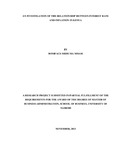| dc.description.abstract | Changes in interest rate have considerable effects on decision making of economic agents and therefore it is one of the main policy variables in macroeconomics. Various factors have influence on interest rate and one of them is inflation rate. Theoretical and empirical studies have mixed results on the relationship between these two variables and therefore provide a fruitful area for further research for developing countries such as Kenya. This study therefore sought to assess the causality between these two variables and the relationship between them.
The study used a correlational design. Secondary data was drawn from the Kenya Bureau of Statistics and the Central Bank of Kenya websites from 1961 – 2011 on interest rate, inflation rate, money supply, and GDP growth rates. Analysis was performed using descriptive analysis, Granger-causality tests, correlation analysis, and regression analysis. This was done through STATA software.
On the causal relationship between interest rate and inflation rate, the study found a unidirectional relationship which ran from inflation to interest rate (p<0.05). With the direction of relationship examined, a further analysis was run to examine whether inflation rate significantly influenced interest rate. The study revealed that inflation rate did not have a significant impact on interest rate (p>0.05). The results further showed that GDP growth has a negative and significant impact on interest rates in Kenya (p<0.05) while money supply had a positive and significant impact on interest rate (p<0.01). The study concludes that there is a unidirectional relationship that runs from inflation to interest rates. The study further concludes that inflation does not have significant effect interest rates but GDP growth and money supply have a significant impact on interest rates in Kenya.
The study recommends that in controlling the interest rates in Kenya, the Central Bank alone through the use of base lending rates is not enough as evidence suggests that the levels of money supply as well as the GDP growth rates are important determinants of interest rates in Kenya. Therefore, policy makers must expand the variables they need to control for the interest rates to be kept at levels that can encourage borrowing. | en |

